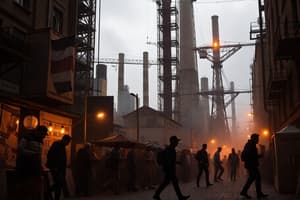Podcast
Questions and Answers
When did the dawn of civilization occur?
When did the dawn of civilization occur?
- 15th century
- 300,000 years ago
- 10,000 years ago (correct)
- 2 million years ago
Which ancient civilizations were associated with the cradle of civilization?
Which ancient civilizations were associated with the cradle of civilization?
- Mayans and Aztecs
- Chinese and Japanese
- Greeks and Romans
- Sumerians and Egyptians (correct)
What key events defined the Age of Exploration and Discovery?
What key events defined the Age of Exploration and Discovery?
- Invention of the printing press
- Industrial Revolution
- Voyages of Christopher Columbus (correct)
- Renaissance art movement
Who is credited with discovering the New World?
Who is credited with discovering the New World?
Which species has the earliest known appearance in human history?
Which species has the earliest known appearance in human history?
What was a significant development during the dawn of civilization?
What was a significant development during the dawn of civilization?
What intellectual and cultural movement characterized the 18th century?
What intellectual and cultural movement characterized the 18th century?
Which event directly inspired by Enlightenment ideals occurred between 1789 and 1799?
Which event directly inspired by Enlightenment ideals occurred between 1789 and 1799?
Which technological advancements were significant during the 19th century?
Which technological advancements were significant during the 19th century?
What major conflict occurred in the 20th century due to colonialism and imperialism?
What major conflict occurred in the 20th century due to colonialism and imperialism?
Which significant event happened in 1967, showcasing human scientific achievements?
Which significant event happened in 1967, showcasing human scientific achievements?
How does studying history help us according to the text?
How does studying history help us according to the text?
Flashcards are hidden until you start studying
Study Notes
Unraveling Humanity's Journey Through Time
Throughout the vast expanse of history, the endless tapestry of human experience has been weaved with moments of triumph, tragedy, innovation, and discovery. Our past serves as a rich source of knowledge, inspiring us to understand our origins and the complexities that have shaped our world. Let's embark on a journey through time to explore the highlights of human history and the pivotal moments that have propelled us forward.
The Dawn of Civilization
Human history can be traced back to the emergence of our ancestral species, such as Homo erectus and Homo sapiens, about 2 million and 300,000 years ago, respectively. The dawn of civilization occurred around 10,000 years ago with the beginning of agriculture, the rise of settled societies, and the development of complex social structures. The cradle of civilization included the fertile lands of Mesopotamia, Egypt, and the Indus Valley, each home to the historic developments of Sumerians, Egyptians, and Indus Valley Civilization.
Ages of Exploration and Discovery
Then, between the 15th and 17th centuries, the Age of Discovery and Exploration gave birth to the global interconnectedness we know today. Christopher Columbus's voyages in 1492, Vasco da Gama's journeys to India, and the quest of Amerigo Vespucci to discover the New World paved the way for the exchange of ideas, goods, and cultures between continents.
The Enlightenment and the Age of Revolution
The 18th century ushered in the Age of Enlightenment, a period of profound intellectual and cultural change that challenged traditional norms and ideas. The ideas of great philosophers, such as John Locke, Jean-Jacques Rousseau, and Thomas Jefferson, inspired revolutions, including the American Revolution (1765-1783), the French Revolution (1789-1799), and the Haitian Revolution (1791-1804).
The Age of Industry and the Two World Wars
The 19th century brought about the Industrial Revolution, marking a period of rapid growth and innovation in manufacturing, transportation, and communication. The world was transformed by the rise of new technologies such as the steam engine, railroads, and telegraph. However, this era was also marred by colonialism, imperialism, and conflict, leading to both World Wars I (1914-1918) and II (1939-1945).
Post-World War II and the Modern Era
In the second half of the 20th century, the world saw the rise of superpowers, the Cold War (1947-1991), and the fight for civil rights and equal opportunities. Advances in science and technology led to remarkable achievements, such as the first successful heart transplant (1967), the first human heartbeat in a laboratory (1983), and the first images of the human genome (2000).
Conclusion
As we look to the future, human history continues to evolve. We stand at the precipice of new discoveries, pushing the boundaries of what we know and understanding the profound impact of our actions on the world around us. By studying the past, we gain insights into the present and the potential of the future, enabling us to shape a better world for all humanity. So, as we navigate the complexities of our shared history, let us remember that each moment, each experience, is a piece of the mosaic that makes up who we are and where we are headed.
Studying That Suits You
Use AI to generate personalized quizzes and flashcards to suit your learning preferences.




